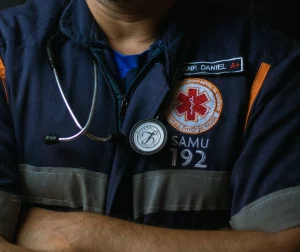It was just before Halloween 2019 when I had the meeting that would change my professional life beyond recognition. This meeting was with the head of a large, publicly funded organisation of front-line emergency workers and first responders. This meeting cam

e about as a result of a desire to help a work force struggling to cope. In the months preceding our meeting there had been a number of deaths as a result of suicide and the intention was to support these officers differently in
order to prevent more deaths.
I had almost finished my CI training and I accepted the challenge with a confidence I would have found hard to access in the past. I had been working as a therapist for many years at this point, and found CI had changed everything, from the way I showed up for my clients to the way, of course, I showed up for myself. Meeting with these officers and having an insight into the world that they occupy was humbling. I had never stopped to consider what this role actually entails… Like many of us, it had simply never crossed my mind.
What I discovered was a demographic who go to work every single day with an expectation that they will be met with aggression, hostility and oftentimes physical violence. These people who show up first to the scene of an accident, a death by suicide, a murder… You name it, they are there. They witness and experience trauma as a normal part of their working lives and to a large extent normalise it, just get on with the job and keep going.
I was struck by the almost universal desire to ‘help other people’ that brought them into this profession, and how, so often, these officers didn’t know how to help themselves. I heard within their stories the pain of trauma that was so often hidden within the ‘myth of normal’ childhood experiences. Very quickly I was seeing a large number of officers and the CI conversations led to a greater understanding amongst people who really needed to understand their own internal experiences. Helping people recognise that their bodies were communicating what their mind had disconnected from, was transformative and empowering all at once. Many of the people I was lucky enough to meet are doing well within their roles as first responders and also within their personal lives.
Within CI we understand that trauma is not what happens to you, but what happens inside of you, as a result of what happened to you. The radical simplicity of ‘getting’ this and understanding it at a somatic level means that I am still there, working with these officers every week. Compassionate Inquiry has touched the lives of many first responders and it inadvertently touches the lives of those who are met with compassion from the people who respond to them in their hour of greatest need. I am grateful to have been a small part of this process.
Testimonial
I wish to express my sincere and continuing gratitude to Lorraine, who has been a part of my life since 2019 when I was referred for therapy through my employer. As a serving police officer working on the frontline, I have to manage a variety of circumstances that test me emotionally and physically on a daily, if not hourly, basis. One traumatic event in particular brought me to accept the help that was offered and I’ve not looked back since meeting Lorraine that day. I had no idea that Lorraine would not only help me with what was at the time a single traumatic event, but that she would then become my salvation for an upcoming journey into parenthood. Compassionate Inquiry and therapy as a whole was completely new to me but now it has become a way of life.
As I navigate through days of being a police officer and a mother of two children, I have access to the words and guidance that Lorraine has taught me over the years. My family and I are forever grateful to Lorraine for her unmeasurable kindness and for her profound knowledge of the mind, body and Compassionate Inquiry. Simply put, Lorraine has changed my life.